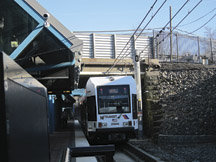Pat Keefe, a North Bergen resident who has relied on commuting by NJ Transit’s Hudson-Bergen Light Rail for the last three years to get to her job in Jersey City, was not at all happy with the proposed fare increase last week.
“I think it stinks,” said Keefe. “I think that [the light rail] needs better service. I mean, all of NJ Transit needs better service. There is no other way around it.”
On May 1 when fares are set to hike, a single light rail trip will go from $1.90 to $2.40. The monthly pass that Keefe and many others purchase will increase from $58 to $73.
“Obviously, nobody is happy about it.” – Chris Burgess
________
The proposed 25 percent fare increases affecting light rail, rail and bus users stem from NJ Transit’s projected $300 million budget deficit for fiscal year 2011.
Service, fares affected
On top of the fare increase, the light rail ten-trip ticket will be eliminated. On weekday evenings after 8 p.m. trains on the system will run every 30 minutes versus every 20 minutes, while on weekends and holidays, there will no longer be direct service from the North Bergen Tonnelle Avenue station to the Hoboken terminal. Around 4,000 customers will be impacted.
According to NJ Transit 32 of the system’s 725 commuter trains will be eliminated.
One-zone bus fares could rise from $1.35 to $1.75, while two-zone commuters could see a hike from $2.15 to $2.70. There will likely be sharp increases for monthly bus passes, and there could be an increase for discounted fares for the elderly and disabled.
Several bus lines will be affected, but no Hudson County lines will be discontinued. The 128, which travels from J.F.K. Boulevard East into New York City, will eliminate three overnight trips every night, which will be replaced with a new overnight 166. The 188, which runs on River Road to New York City, will change peak service times from every 30 minutes to 45 minutes.
Hudson County bus users
Ray Hernandez, a Union City resident, commutes to her job at Palisades Medical Center by taking a bus to the Union City light rail station, then the light rail to the Port Imperial station in Weehawken, and hopping on the 188 or 158 bus on River Road.
She purchases a monthly bus pass.
“I’ll be stuck with whatever happens,” said Hernandez. “Regardless, I would have to take it.”
She said that while her busses are still running, she hopes that the budget could be balanced without inconveniencing people.
He Park, a North Bergen River Road resident, was upset that she would pay more for NJ Transit, but didn’t feel that service was getting any better.
North Bergen residents Bill Clifford and his wife have relied on public transportation since they moved here from New York. The many bus lines they use include the 128 and 166.
“I mean, living right outside in New Jersey and working in New York, I kind of expected the prices were going to keep going up, but they’ve gone up tremendously since I’ve lived here.”
Clifford purchases a two-zone bus pass and is also impacted by rising fares of New York’s Metropolitan Transit Authority.
“It’s definitely a worry,” said Clifford. “One of the reasons my wife and I are looking to move out of here is just because of how draining the commute is in the first place…and the amount of cost every month for a monthly bus pass and train pass.”
Keeping commuters happy
NJ Transit says the increases are due to a four percent ridership decrease statewide. The cuts, which they say will balance ridership with service, are expected to generate more than $140 million in revenue.
Mayor Nicholas Sacco was “not at all pleased” by the changes to the light rail.
“We worked hard to make the light rail successful and I fear this may force people in taking their own personal transportation [again].”
Sacco said that last year the township started a free shuttle that transports residents to the station, paid largely through a grant, in an attempt to improve ridership. North Bergen’s station is at the end of the line and was considered to be under-used. He hopes the light rail will extend from this stop north to Bergen County.
“It’s very difficult for me to say they should go back to the original way, that it was working,” said Sacco. “We are all having economic problems. I feel that they should have attempted to find other ways than attempt to interfere with the light rail.”
Lynn Certain, a Bergen County resident who purchases a monthly light rail pass for her commute, said that she had “no issue” with NJ Transit increasing fares. She viewed it as a sign of the economic times.
“It’s a nice trip and it’s not the MTA,” said Certain.
For Bergen County resident Chris Burgess, the North Bergen light rail stop is the cheapest way he has found to get into New York. Previously, he parked at Weehawken’s stop, but that cost $125 more in parking per month.
“Obviously, nobody is happy about it,” said Burgess.
Public hearings are scheduled in 11 different locations including Secaucus from March 25-27. For more information, visit www.njtransit.com/budget.
Tricia Tirella may be reached at TriciaT@hudsonreporter.com.
